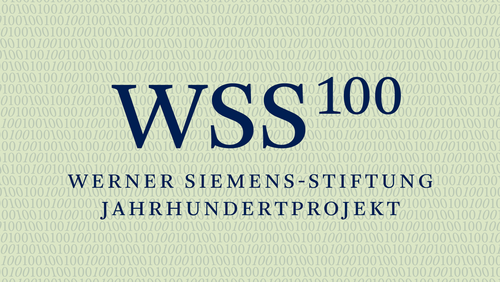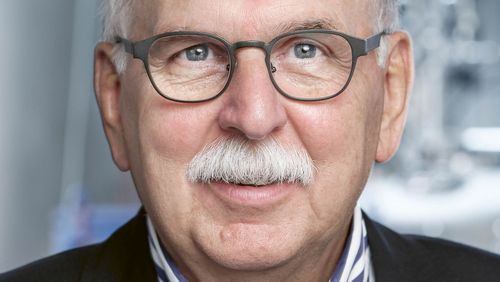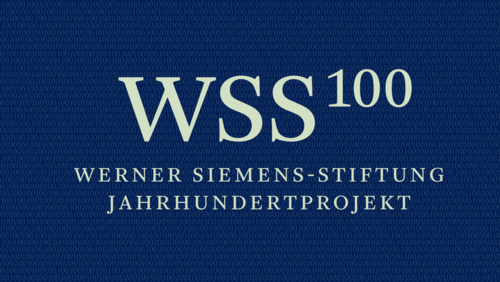
Six WSS research prizes awarded in a festive ceremony
On 16 June 2023, the Werner Siemens Foundation hosted an award ceremony in Lucerne to present a WSS research prize in the amount of one million Swiss francs to each of the six finalists in the “project of the century” competition.
The governing bodies of the Werner Siemens Foundation were in full attendance at the Hotel Astoria in Lucerne: the Foundation Board, the Scientific Advisory Board and the Siemens Family Advisory Board all welcomed the six prize-winning teams.
“Today we’re celebrating your success and are delighted to present you with the award,” is how Professor Matthias Kleiner, Scientific Advisory Board member and head of the “project of the century” competition, greeted the finalists. He explained that the six WSS research prizes are designed to support the winning teams in further developing their ideas over the coming months. Each team will draw up a detailed strategy for setting up a WSS Research Centre for the sustainable use of natural resources, which is endowed with a grant of 100 million Swiss francs.

Far-sighted, innovative, practical
In his address, Hubert Keiber, Chair of the Foundation Board, touched on the origins of the Werner Siemens Foundation in 1923 and related how daughters of the Siemens company founders established and endowed the Foundation. He said their foresight is the reason “we’re here today”, as the Foundation launched the “project of the century” competition to celebrate its 100th anniversary.
The new WSS Research Centre is envisioned as a place for far-sighted endeavours, a place where an interdisciplinary team can do their best work and pursue their innovative approach to developing technologies for a sustainable use of the world’s natural resources. Hubert Keiber explained that the overarching goal of the research centre is to make a substantial contribution to the global efforts towards sustainability. Oliver von Seidel stressed that the “project of the century” also has the full support of the Siemens Family Advisory Board.
During the award ceremony, the six prize winners had the opportunity to briefly present their ideas for a WSS Research Centre and answer the probing questions asked by the distinguished members of the Foundation’s Scientific Advisory Board.

Six award-winning ideas
“ChemSysCon: New Chemical Systems for the Conversion of Sustainable Resources” aims to create safe and sustainable chlorochemical processes. Prof. Dr Sebastian Hasenstab-Riedel from Freie Universität Berlin presented the idea, which envisions a collaboration with teams at the Fraunhofer Institute for Applied Polymer Research (IAP) and the German federal office for materials research (BAM).
The project aim of “catalaix: Catalysis for a Circular Economy” is developing an integrated circular economy for various kinds of plastics (PET and polyethylene, for example), in which novel catalysts play a major role in the sustainable manufacture of products. Prof. Dr Jürgen Klankermayer and Prof. Dr Regina Palkovits from RWTH Aachen University presented the project.
The underlying idea in “Revolution of Food Production” is a circular, pesticide-free, sustainable and extremely high-yield vertical farming system to help meet the nutritional needs of the world’s growing population using sustainable technologies. Prof. Dr Senthold Asseng from Technical University of Munich presented the project concept.
“Fuels and Commodities out of Thin Air”—this project aims to generate electricity directly from sunlight and, in a single step, produce and store cost-effective, ecological hydrogen. Prof. Dr Greta Patzke from the University of Zurich presented the project idea, which envisions a collaboration with teams from the Swiss Federal Laboratories for Materials Science and Technology (Empa) and the Swiss Federal Institute of Aquatic Science and Technology (Eawag).
The project “Highly Efficient Generation of Electricity and Hydrogen from Solar Energy” plans to increase the efficiency of solar modules made of sustainable materials, to minimise energy consumption during manufacturing, and to reduce the surface area of the modules. Prof. Dr Andreas Bett and Dr Frank Dimroth from the Fraunhofer Institute for Solar Energy Systems and the University of Freiburg in Breisgau presented their project proposal.
“RenewSusCat: Renewable Energy for Sustainable Catalysis” aims to combine catalysis of carbon and hydrogen compounds with renewable energies and directly use the catalysis process for the synthesis of new products for pharmaceuticals and life sciences. Prof. Dr Lutz Ackermann from the Georg-August-Universität Göttingen presented the project.

First row (left to right): Hubert Keiber (Chair of the WSS Foundation Board), Rainer Haag (FU Berlin), Sebastian Hasenstab-Riedel (FU Berlin), Timm John (FU Berlin), Gianni Operto (Chair of the WSS Scientific Advisory Board)
Top row (left to right): Peter Athanas (WSS Foundation Board Member), Beat Voegeli (WSS Foundation Board Member), Oliver von Seidel (Chair of the WSS Scientific Advisory Board), Matthias Kleiner (WSS Scientific Advisory Board Member), Christina Ezrahi (Siemens Family Advisory Board Member), Alexander von Brandenstein (Siemens Family Advisory Board Member)

First row (left to right): Hubert Keiber (Chair of the WSS Foundation Board), Peter Athanas (WSS Foundation Board Member), Senthold Asseng (TU Munich), Sandra Schuster (TU Munich), Gianni Operto (Chair of the WSS Scientific Advisory Board)
Top row (left to right): Beat Voegeli (WSS Foundation Board Member), Oliver von Seidel (Chair of the WSS Scientific Advisory Board), Matthias Kleiner (WSS Scientific Advisory Board Member), Christina Ezrahi (Siemens Family Advisory Board Member), Alexander von Brandenstein (Siemens Family Advisory Board Member)

First row (left to right): Hubert Keiber (Chair of the WSS Foundation Board), Oliver von Seidel (Chair of the Siemens Family Advisory Board), Stefan Seeger (University of Zurich), David Tilley (University of Zurich), Greta Patzke (University of Zurich), Gianni Operto (Chair of the WSS Scientific Advisory Board)
Top row (left to right): Peter Athanas (WSS Foundation Board Member), Kathrin Fenner (Eawag), Matthias Kleiner (WSS Scientific Advisory Board Member), Christina Ezrahi (Siemens Family Advisory Board Member), Beat Voegeli (WSS Foundation Board Member), Alexander von Brandenstein (Siemens Family Advisory Board Member)

First row (left to right): Hubert Keiber (Chair of the WSS Foundation Board), Oliver von Seidel (Chair of the Siemens Family Advisory Board), Frank Dimroth (Fraunhofer Institute for Solar Energy Systems ISE), Andreas Bett (Fraunhofer Institute for Solar Energy Systems ISE), Gianni Operto (Chair of the WSS Scientific Advisory Board
Top row (left to right): Peter Athanas (WSS Foundation Board Member), XY, Saskia Kühnhold-Pospischil (Fraunhofer Institute for Solar Energy Systems ISE), Matthias Kleiner (WSS Scientific Advisory Board Member), Christina Ezrahi (Siemens Family Advisory Board Member), Beat Voegeli (WSS Foundation Board Member), Alexander von Brandenstein (Siemens Family Advisory Board Member)

First row (left to right): Hubert Keiber (Chair of the WSS Foundation Board), Metin Tolan (President of the University of Göttingen), Lutz Ackermann ( Georg-August-Universität Göttingen), Gianni Operto (Chair of the WSS Scientific Advisory Board)
Top row (left to right): Oliver von Seidel (Chair of the Siemens Family Advisory Board), Peter Athanas (WSS Foundation Board Member), Matthias Kleiner (WSS Scientific Advisory Board Member), Christina Ezrahi (Siemens Family Advisory Board Member), Beat Voegeli (WSS Foundation Board Member), Alexander von Brandenstein (Siemens Family Advisory Board Member)

Left to right: Hubert Keiber (Chair of the WSS Foundation Board), Beat Voegeli (WSS Foundation Board Member), Peter Athanas (WSS Foundation Board Member) Oliver von Seidel (Chair of the WSS Siemens Family Advisory Board), Regina Palkovits (RWTH Aachen University), Matthias Kleiner (WSS Scientific Advisory Board Member), Jürgen Klankermayer (RWTH Aachen University) Christina Ezrahi (Siemens Family Advisory Board Member), Alexander von Brandenstein (Siemens Family Advisory Board Member), Gianni Operto (Chair of the WSS Scientific Advisory Board)
Strategy to set up a WSS Research Centre
After the researchers presented their ideas, Hubert Keiber, Chair of the Foundation Board, and Oliver von Seidel, Chair of the Siemens Family Advisory Board, awarded each of the six project teams a WSS research prize of one million Swiss francs.
The six teams now have until 31 October 2023 to concretise their concepts, as Matthias Kleiner said when outlining the final phase of the “project of the century” competition. He stressed that the prize-winning research teams are of the highest quality and that WSS had carefully selected the six finalists from a total of 123 project proposals. “We very much look forward to your plans for the research centre,” he said, adding that the final decision on who will receive the prize of 100 million Swiss francs to establish a WSS Research Centre dedicated to technologies for the sustainable use of natural resources will most likely be made before Christmas.




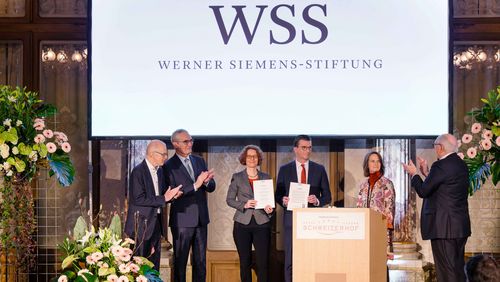
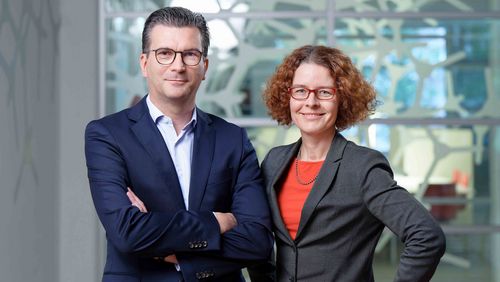
![[Translate to English:] [Translate to English:]](/fileadmin/_processed_/8/d/csm_01-WSS100-Muenchen_a4e2ba3a7f.jpg)
![[Translate to English:] [Translate to English:]](/fileadmin/_processed_/0/7/csm_01-WSS100-Zuerich_20aa6e51dd.jpg)
![[Translate to English:] [Translate to English:]](/fileadmin/_processed_/5/e/csm_01-WSS100-Aachen_c843f6f8ae.jpg)
![[Translate to English:] [Translate to English:]](/fileadmin/_processed_/8/e/csm_01-WSS100-Berlin_8becb34d03.jpg)
![[Translate to English:] [Translate to English:]](/fileadmin/_processed_/3/5/csm_01-WSS100-Freiburg_8ff515d64a.jpg)
![[Translate to English:] [Translate to English:]](/fileadmin/_processed_/e/3/csm_01-WSS100-Goettingen_f4c6bb4b9f.jpg)
